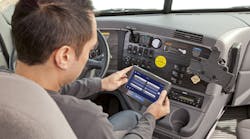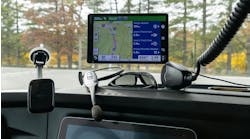A broad survey of 508 fleet operations across the U.S. regarding their use of mobile resource management (MRM) systems finds that, of those using such technology, a significant majority are not only satisfied with the service they’re receiving but that they are recouping their investment via a wide array of savings such as improved fuel economy, reductions in vehicle idle time, etc.
“Fleets using MRM systems are finding very high value in them and have a very high satisfaction rate with them; basically a 4.1 one on a 5 point scale,” Clem Driscoll, president of consulting and marketing research firm C.J. Driscoll & Associates, explained to Fleet Owner. “That very high satisfaction rate is but one indicator that the market for MRM technology in fleet operations will stay very strong.”
Driscoll said his firm’s telephone study – officially titled the 2013-14 Survey of Fleet Operator Interest in MRM Systems and Services – included TL and LTL carriers, private delivery fleets, construction-related fleets, and others, focusing on operator interest, use, and satisfaction with GPS [global positioning system] fleet management, driver behavior management, and GPS-equipped handset/portable solutions for managing mobile workers.
He added that out of the fleet operators participating in the survey, 42% operate Class 6-8 trucks and one-third of the total sample were comprised of TL/LTL carriers, private trucking fleets or local common carriers.
While only 36% of those fleets polled said they used a GPS-based system, the firm found that 79% of them were either satisfied or somewhat satisfied with their service, with 67% reporting that they recouped their investment in such technology.
Driscoll noted that such recoupment occurred by generating savings across a broad array of fleet operating metrics. For example, one private food delivery fleet operating 120 trucks achieved $167,600 per year in fuel and mileage savings plus $127,400 in driver time savings.
In other examples, a Connecticut-based regional water company operating 300 vehicles said it saved $64,000 in fuel costs a year by being able to control excess idling via is MRM system, while a county government fleet in Michigan noted MRM technology allowed it to gain $300 per day of “more production” per vehicle in its 80-unit operation.
“The interesting thing is that such numbers were being given right off the top of their heads as this was a real-time telephone survey; they didn’t have time to consult reports,” Driscoll stressed. “It costs money to install such technology but they know at the end of the day they are saving more money through it. That’s why this is such a strong indicator that demand for MRM systems will only keep growing.”
Driscoll’s survey uncovered other interesting aspects of MRM use patterns as well among the fleets participating in its survey:
- Some 58% of the fleets participating in its poll operate 50 or fewer vehicles, with the midpoint fleet size on its survey pool 35 vehicles
- In terms of route structure, 39% use dynamic routing based on real-time data, while 38% stick to pre-scheduled routes and 12% use fixed routes
- The basic communication device relied upon by the truck drivers in the fleets surveyed is the cell phone (67%), with 45% using smartphones and 18% using tablets or laptops
- The top benefit of GPS-based MRM systems cited by those using them is vehicle location (54%) with 37% citing driver performance and safety monitoring, 24% noting reduce idle time and fuel consumption, 18% route optimization, and 9% maintenance and repairs
- Some 68% do not integrate their MRM technology with back-office systems
The survey also noted that 31% of those fleets using a GPS-based fleet management system said they received an insurance discount for doing so – a finding that surprised Driscoll.
“I’m really surprised at the number of fleets that reported getting an insurance discount; we didn’t realize it was that common,” he said. “But we think the growing number of insurance providers that offer MRM packages of their own and that have used the data gained from them to monitor fleet safety, accident rates, etc., is beginning to influence their discount decisions.”



